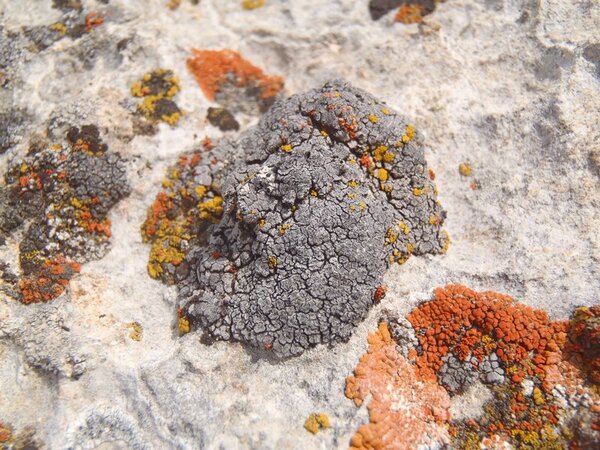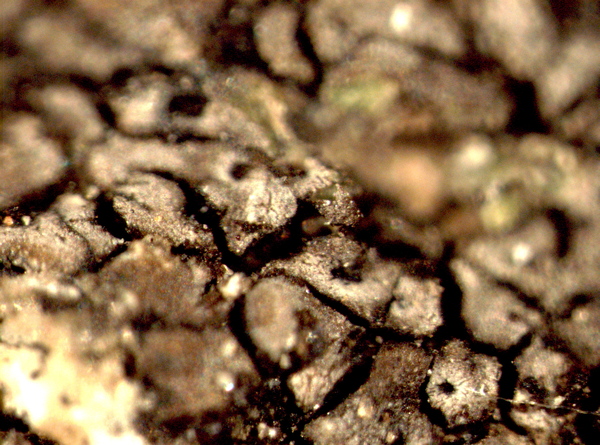Heteroplacidium compactum (A. Massal.) Gueidan & Cl. Roux
Bull. Inf. Ass. Franç. Lichén., 33, 1: 25, 2008. Basionym: Placidium compactum A. Massal. - Miscell. Lichenol.: 32, 1856.
Synonyms: Catapyrenium compactum (A. Massal.) R. Sant.; Dermatocarpon compactum (A. Massal.) Lettau; Dermatocarpon compactum var. eurysporum Lettau; Dermatocarpon crassulum (Müll. Arg.) Zahlbr.; Endopyrenium crassulum Müll. Arg.; Rhodocarpon compactum (A. Massal.) Lönnr.; Verrucaria compacta (A. Massal.) Jatta
Description: Thallus crustose-areolate to subsquamulose, medium to usually dark brown, smooth, dull. Areoles at first angular, then rounded, flat to slightly convex, to 4 mm wide and to 0.6 mm thick, sometimes sublobate and partly overlapping, constricted at base to form short peg-like projections composed of vertically oriented hyphae. Upper cortex paraplectenchymatous, of 5-8 µm wide cells, 10-25 µm thick, with a brown uppermost layer overlain by an up to 20 µm thick epinecral layer; medulla white, paraplectenchymatous; lower cortex absent. Perithecia immersed, 0.25-0.4 mm across, without involucrellum; exciple subglobose, colourless with only the apex brown-black, darkening throughout with age; hamathecium of periphyses and periphysoids, interascal filaments absent; hymenial gel hemiamyloid. Asci 8-spored, clavate, I-, fissitunicate, the wall thickened above, Verrucaria-type, 55-70 x 13-20 µm. Ascospores 1-celled, hyaline, broadly ellipsoid to subglobose, 13-18 x 8-10 µm, biseriately arranged in the asci. Pycnidia laminal, immersed, black, of the Dermatocarpon-type. Conidia bacilliform, 5-7 x c. 1.5 µm. Photobiont chlorococcoid (Myrmecia). Spot tests: cortex and medulla K-, C-, KC-, P-, UV-. Chemistry: without lichen substances.
Growth form: Crustose
Substrata: rocks
Photobiont: green algae other than Trentepohlia
Reproductive strategy: mainly sexual
Poorly known taxon in need of further study
Commonnes-rarity: (info)
Alpine belt: absent
Subalpine belt: extremely rare
Montane belt: very rare
Dry submediterranean belt: absent
Humid submediterranean belt: absent
Padanian area: absent
pH of the substrata:
1 2 3 4 5
Solar irradiation:
1 2 3 4 5
Aridity:
1 2 3 4 5
Eutrophication:
1 2 3 4 5
Poleotolerance:
0 1 2 3
Altitudinal distribution:
1 2 3 4 5 6
Rarity
absent
extremely rare
very rare
rare
rather rare
rather common
common
very common
extremely common
Loading data...
Occurrence data
Predictive map
Growth form: Crustose
Substrata: rocks
Photobiont: green algae other than Trentepohlia
Reproductive strategy: mainly sexual
Poorly known taxon in need of further study
Commonnes-rarity: (info)
Alpine belt: absent
Subalpine belt: extremely rare
Montane belt: very rare
Dry submediterranean belt: absent
Humid submediterranean belt: absent
Padanian area: absent
pH of the substrata:
| 1 | 2 | 3 | 4 | 5 |
Solar irradiation:
| 1 | 2 | 3 | 4 | 5 |
Aridity:
| 1 | 2 | 3 | 4 | 5 |
Eutrophication:
| 1 | 2 | 3 | 4 | 5 |
Poleotolerance:
| 0 | 1 | 2 | 3 |
Altitudinal distribution:
| 1 | 2 | 3 | 4 | 5 | 6 |
Rarity
absent
extremely rare
very rare
rare
rather rare
rather common
common
very common
extremely common
Loading data...
Occurrence data
Predictive map








